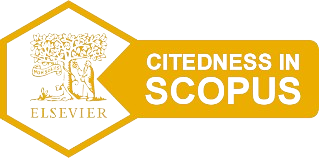Promoting EFL Students’ Academic Character through Instructional Practice in Revolution Industry 4.0
DOI:
https://doi.org/10.15408/tjems.v7i2.18998Keywords:
higher education, EFL Students Character, EFL Teacher, teaching and learning, pendidikan tinggi, Karakter Siswa EFL, Guru EFL, mengajar dan belajarAbstract
Abstract
This study investigates English as a Foreign Language (EFL) teachers' instructional practices in developing students' academic character. Self-evaluation questionnaires were distributed to 37 teachers, and 26 were returned. Seven Focus Group Discussion (FGD) participants were selected based on their availability. The study reveals that EFL teachers averagely facilitated students to enhance their academic character and rated developing students' academic character at a critical level. There are five majors handicap for EFL teachers in developing students' academic character. First, the curriculum does not integrate the academic character with the courses offered. Second, implementing academic character into the curriculum is time-consuming. Besides, teachers assume that their students can automatically apply academic character in their life without it should be integrated into the courses. Lastly, the teaching loads that teachers must do are enormous. Drawing from those problems, several recommendations are proposed: curriculum policy at the university level should be taken, providing a standard syllabus application, providing a simple evaluation system, and freeing EFL teachers from bureaucratic and administrative burdens. Furthermore, the current study has sounded the research result to university academic authority and recommended that the department embed students' academic character in learning and suggested the EFL teachers embed and assess students' academic character development through instructional practices.
Abstrak
Studi ini menyelidiki praktik instruksional guru English as a Foreign Language (EFL) dalam mengembangkan karakter akademik siswa. Kuesioner evaluasi diri dibagikan kepada 37 guru, dan 26 dikembalikan. Tujuh peserta Focus Group Discussion (FGD) dipilih berdasarkan ketersediaan mereka. Studi ini mengungkapkan bahwa guru EFL rata-rata memfasilitasi siswa untuk meningkatkan karakter akademis mereka dan menilai pengembangan karakter akademis siswa pada tingkat kritis. Ada lima jurusan yang menjadi kendala bagi guru EFL dalam mengembangkan karakter akademik siswa. Pertama, kurikulum tidak mengintegrasikan karakter akademik dengan mata kuliah yang ditawarkan. Kedua, menerapkan karakter akademik ke dalam kurikulum memakan waktu. Selain itu, guru beranggapan bahwa siswanya dapat secara otomatis menerapkan karakter akademik dalam kehidupannya tanpa perlu diintegrasikan ke dalam mata pelajaran. Terakhir, beban mengajar yang harus dilakukan guru sangat besar. Berangkat dari permasalahan tersebut, beberapa rekomendasi diusulkan: kebijakan kurikulum di tingkat universitas harus diambil, penyediaan penerapan silabus yang standar, penyediaan sistem evaluasi yang sederhana, dan membebaskan guru EFL dari beban birokrasi dan administrasi. Selanjutnya, penelitian ini telah menjajaki hasil penelitian kepada otoritas akademik universitas dan merekomendasikan agar departemen tersebut menanamkan karakter akademik siswa dalam pembelajaran dan menyarankan guru EFL untuk menanamkan dan menilai pengembangan karakter akademik siswa melalui praktik pembelajaran.
How to Cite: Hadiyanto. (2020). Promoting EFL Students' Academic Character Through Instructional Practice in Revolution Industry 4.0. TARBIYA: Journal of Education in Muslim Society, 7(2), 167-182. doi:10.15408/tjems.v7i2.18998.
References
Bath, D. Smith, C. Stein, S. and Swann, R (2004) Beyond mapping and embedding graduate attributes: bringing together quality assurance and action learning to create a validated and living curriculum Higher Education Research & Development. 23:3: 313-328.
Berkowitz, W., M and Bier, M. (2004). Research-Based Character Education. The Annals of the American Academy of Political and Social Science. ANNALS, AAPSS. 591: pp 72-86.
Bialik, M. Bogan, M. Fadel, C. and Horvathova, M. (2015). Character Education for the 21st Century: What Should Students Learn? Survey of Outcomes Measurement in Research on Character Education Programs. Center for Curriculum Redesign Boston, Massachusetts. www.curriculumredesign.org
Derlina, Sabani, Satria, Mihardi (2015). Improved Characters and Student Learning Outcomes Through Development of Character Education Based General Physics Learning Model. Journal of Education and Practice. 6 (21): 162-170.
DIKTI. 2011. Kerangka Kualifikasi Nasional Indonesia. Kajian Tentang Implikasi dan Startegi Implimentasi KKNI. http://penyelarasan.kemdiknas.go.id/uploads/file/Buku%20Qualification%20Framework%20DIKTI.pdf
Djailani, A., R (2013). Strategy Character Building of Students at Excellent Schools in the City of Banda Aceh. IOSR Journal of Research & Method in Education. 1 (5): 49-59.
Fogarty, R. & Stoehr, J. (2008). Integrating curricula with multiple intelligences (2nd ed.). Thousand Oaks, CA: Corwin Press.
Hadiyanto, (2019b). Constructing A Prototype of Developing Students' 21st Century Skills; Soft Skills, Hard Skills and Competiveness at a University in Indonesia. ICEMS 2019, pp.1-8. https://eudl.eu/pdf/10.4108/eai.30-9-2019.2291171
Hadiyanto, Fajaryani, N., & Masbirorotni (2018). Constructing the measurement of EFL students' core competencies practices in learning activities. TOJET, 17(3): 16-25.
Hadiyanto, H. (2019a). The EFL Students' 21st Century Skill Practices through E-Learning Activities. IRJE (Indonesian Research Journal in Education). 3(2): 461-473.
Hair, J.E., Anderson., R.E. Tatham, R.L. & Black, W.C. (2006). Multivariate Data Analysis. Ed .5th. Upper Saddle River: Prentice Hall.
Iqbal Ahmad, Hamdan Said, Alam Zeb, Sihatullah, Khalil ur Rehman (2013). Effects of Professional Attitude of Teachers on their Teaching 3 Performance: Case of Government Secondary School Teachers in 4 Malakand Region. Journal of Educational and Social Research. 3: pp.25 – 31. Doi: 10.5901/jesr.2013.v3n1p25
Kemendiknas. (2011). Panduan Pendidikan Karakter. Jakarta: Badan Penelitian dan Pengembangan Pusat Kurikulum dan Perbukuan.
Kementerian Pendidikan (2010). Pengembangan Pendidikan Budaya dan Karakter Bangsa: Pedoman Sekolah. Jakarta: Puskur. Balitbang Kemendiknas.
Lapsley, D. K., & Narvaez, D. (2006). Character Education. In K. A. Renninger, I. E. Sigel, W. Damon, & R. M. Lerner (Eds.), Handbook of child psychology: Child psychology in practice (p. 248–296). John Wiley & Sons Inc. https://www.researchgate.net/publication/227555957_Character_Education.
Pallant, J. (2011). A Step by Step Guide to Data Analysis Using SPSS Program. Survival Manual. 4th Edition. China: Everbest Printing.
Person, Ann, E. Moiduddin, M. Hague-Angus, M. and Malone, L.M. (2009). Survey of Outcomes Measurement in Research on Character Education Programs (NCEE 2009-006)," Washington, DC: National Center for Education Evaluation and Regional Assistance, Institute of Education Sciences, U.S. Department of Education. This report is available on http://ies.ed.gov/ncee/pdf/2009006.pdf
Ristekdikti (2015). Standar nasional pendidikan tinggi direktorat penjaminan mutu. Retrieved from: http://bpm.umsida.ac.id/wp-content/uploads/2017/08/3.-Standar- Nasional-Pendidikan-Tinggi-SN-Dikti.pdf.
Rusijono and Khotimah., K (2018). The implementation of assessment model based on character building to improve students' discipline and achievement. Universitas Negeri Surabaya. The Consortium of Asia-Pacific Education Universities (CAPEU). IOP Conf. Series: Materials Science and Engineering. 296: pp. 1-5.
Trianto. 2007. Model Pembelajaran Terpadu dalam Teori dan Praktek, Jakarta: Prestasi Pustaka
UNJA. (2014). Rencana strategis bisnis Universitas Jambi 2014-2018: Menuju Universitas Unggulan untuk Meningkatkan Daya Saing Bangsa 2025. Retrieved from https://siakad.unja.ac.id/ terpadu/dokumen/universitas/02-Renstra%20Bisnis%20UNJA%20%20(2014)%20-%20Lengkap.pdf.
Veugelers, W. (2011). Education and Humanism. Linking Autonomy and Humanity. Roterdam, The Netherlands: Sense Publishers. https://link.springer.com /book/10.1007%2F978-94-6091-577-2
Vezzuto, L. A. (2004). How Young People Develop Character: A Conceptual Framework with Descriptions of Promising Practices. Institute for Character Education: Instructional Services Division, Learning Support Unit.
Woo, S., H. (2018). Attitudes and Performance of Workers Preparing for the Fourth Industrial Revolution. KSII Transactions on Internet and Information Systems. 12 (8): pp. 4038 – 4056.











